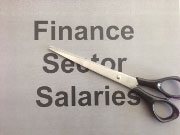News
Key findings of the Finnish survey on salary reviews

Growing negative attitude towards salary reviews in the finance sector
A clear result from the Finnish union Pro’s survey is that approximately 70 percent of Pro’s members in the finance sector say that they relate more negatively towards salary reviews than before.
Although the degree of satisfaction with the salary review model has not significantly changed among the white collar group, around 70 percent of Pro’s members in the finance sector say that they relate more negatively to wage reviews than before.
“Less than one in five respondents feels that they can influence the end result of a salary review talk and the resultant rise. Four out of five respondents feel that the salary review model impairs the atmosphere on the workplace”, says union official Ira Saarnio explaining the growing negative attitude towards salary reviews.
During autumn 2012 four salary reviews were carried out in the finance sector, except for Danske Bank, where a fifth round of talks was held. After the salary reviews Pro examines on an annual basis how popular the model used to distribute pay rise among the members is .Initially the survey was a joint effort between all unions, but the last two years, the survey results included only Pro members.
12,000 Pro members work in the finance sector, of whom 1,570 responded to Pro’s survey.
Young men get the highest rises
There are many assumptions about salary review increases. Based on the survey it appears for example that that the size of a monthly salary does not influence the distribution of salary increases. However, gender and age had an impact: men get higher increases than the percentage of women and the highest increases have gone to those born between 1976 and 1985.
According to Antti Hakala, Director of Pro's finance sector it is important to pay special attention to managerial work in salary reviews.
“It is in the spirit of the salary review model that a person's job description, degree of difficulty, personal skills and how a person manages his or her own tasks is considered in a dialogue between manager and employee. Both should therefore be well prepared and the discussion should be relevant to the distribution of the salary increase”, says Antti Hakala.
Based on the survey responses, it appears that when a manager has a good understanding of the model's content and comes prepared and can justify views the salary review model works better and people have a positive attitude to it. Nevertheless there are problems at some workplaces, and in such cases it would be good to focus on a common managerial approach. On the basis of the responses it also seems necessary to update the classification of the level of difficulty of tasks
According to Hakala salary review talks used in a proper way should motivate, encourage and improve the workplace atmosphere, not vice versa.
“Furthermore the survey revealed respondents' concerns about the level of salary rise and the income level in the finance industry”, says Hakala.
There is a clear advantage with the salary review model.
“Nowadays, almost everyone who works in the finance sector has updated job descriptions and the difficulty classification is better than for five years ago. Based on the answers, members have good knowledge of wages, though, in terms of salary satisfaction the situation is far from ideal, recalls union official Saarnio.
“The survey yielded valuable information about the views on salary review talks and that will help us to think about how to develop the wage system”, says Antti Hakala.

